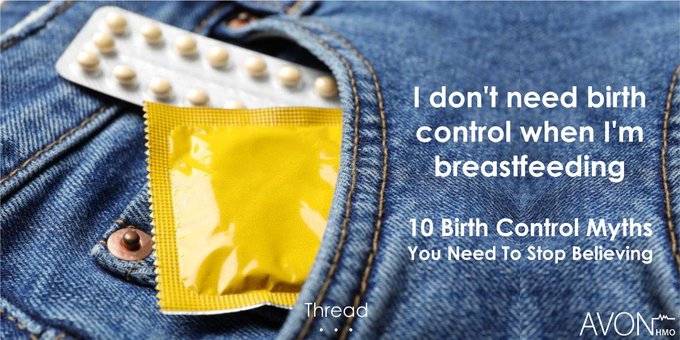10 birth control myths busted! Birth control pill myths and facts.
What are some myths and misconceptions about contraceptives?
Some myths are harmless but when it’s about contraception, believing a myth may be the difference between an unwanted pregnancy and a baby girl just living life. So let’s talk about the birth control myths you shouldn’t take seriously.

Myth 1: Any form of birth control also prevents sexually transmitted infections.
Fact: The only kinds of birth control that protect against both pregnancy & sexually transmitted infections are male and female condoms.
This is because condoms as barrier methods, cut down on the two possible vectors of STI transmission: sexual fluids and skin-to-skin contact.
Still, condoms can’t fully eliminate skin-to-skin contact, which means that even when you use them, you’re still at risk of getting certain STIs, such as herpes and human papillomavirus (HPV). The only real way to stay safe is to get tested regularly to know your status.
Myth 2: IUD isn’t a good birth control method if you haven’t had a child.
Fact: Nah, this, ain’t it. There’s a reason obstetricians and gynaecologists recommend long-acting reversible contraceptives like IUDs for teenagers, most of whom obviously haven’t given birth.
The reason people think IUDs are better for women who have had kids is that vaginal births mean that the cervix has had some practice dilating significantly. Therefore, the theory is that the IUD insertion may not hurt as much. That, however, doesn’t mean you can’t get an IUD if you haven’t given birth—it should work just as well to protect you from pregnancy. Regarding the pain, people’s experiences when getting IUDs vary whether or not they’ve had kids.
Myth 3: You always have to take the pill at the exact same time every day, no matter which kind you use.
Fact: Yeah, this is kind of true. If you’re taking the minipill for instance, much of its efficacy hinges on taking it as close to the same time every day as you can. This is because the minipill relies on only one hormone to keep you pregnancy-free & it’s at a lower dose than combined hormonal pills. If you take it more than 3 hours after you should, your protection is compromised and you should use a backup for at least two days (condoms).
If, on the other hand, you’re on a combined hormonal birth control pill, the estrogen in it will work to reliably suppress your ovulation, and you’ll also have higher levels of progestin. That means you have some more wiggle room with when exactly you take the pill.
Myth 4: Birth control pills will make you gain weight.
Fact: People say this a lot but there’s no solid scientific confirmation that either combined hormonal birth control pills or the minipill cause weight gain. A 2016 review in Cochrane Database of Scientific Reviews looked at 22 studies surrounding progestin-only forms of birth control and essentially found that there wasn’t enough evidence showing that combined hormonal contraceptives have any large effect on weight.
The only birth control that is explicitly linked with weight gain is Depo-Provera (often called “the shot,” it’s an injection of progestin you get every three months). If that’s something that matters to you, bring it up with your doctor when discussing contraceptive options.
Myth 5: The ring can get lost inside your body.
Fact: NuvaRing, also called “the ring,” is a little flexible plastic ring that you insert into your vagina for three weeks every month. The ring contains a mix of estrogen and progestin to help prevent unintended pregnancy.
Though you may feel nervous that this little device can get lost up there while doing its job, there’s really no need. Your vagina is just a tunnel with an end, so there’s no way this can happen. If you think your NuvaRing is “lost,” it might just be stuck high up your cervix.
Myth 6: Fertility awareness-based methods are just as effective as birth control pills.
Fact: Err, not really. Estimates show that fertility awareness-based methods has a failure rate of 24 out of 100 in the first year. Birth control pills, have a failure rate of 9 out of 100. Ovulation usually happens on day 14 of a 28-day menstrual cycle, but that doesn’t mean it’ll be true for you; it can change due to stress. or hormonal problems. Also, not everyone has a 28-day menstrual cycle.
In addition, sperm can live in you for up to five days after having sex so, if you have unprotected sex because you think you’re not ovulating, then you ovulate anywhere up to five days later, you could, in theory, get pregnant.
Myth 7: Hormonal birth control can mess up your fertility.
Fact: After quitting most forms of birth control, you’ll return to normal within a few cycles. The only real exception is the Depo-Provera shot, which has been shown to delay ovulation for 10 months in some people. If you notice you’re having a harder time than expected getting pregnant when you come off birth control, it could simply be that you were on contraception for a long enough time for your fertility to have declined naturally.
It could also be that your contraception was masking an underlying problem that you only discover once you go off of it. Either way, talking to your doctor can help you make sure you’re maximizing your chances of conceiving.
Myth 8: Your body needs to take a break from hormonal birth control sometimes.
Fact: There’s no scientific proof of this. If you want to go off your birth control to see what your body is like without the added hormones, that’s fine. Just use a backup or abstain from sex.
Myth 9: You don’t need birth control if you’re breastfeeding.
Fact: Although breastfeeding typically suppresses ovulation & menstruation (lactational amenorrhea, which occurs because breastfeeding disrupts the typical hormonal process), it’s not a secure method of birth control!
Here’s the caveat: For maximum efficacy, you’d need to go no longer than four hours without breastfeeding in the day and no longer than six hours at night. You’d also need to exclusively breastfeed, so no supplementing with formula. Eventually, you’ll still ovulate.
It is recommended that people only use breastfeeding as a temporary form of birth control for six months max or until menstruation starts again, whichever comes first. Even that’s not foolproof. What if the above doesn’t occur but you ovulate without realizing it?
Myth 10: Vasectomy is 100% effective
Fact: It’s very rare but a vasectomy can still fail. When a person has a vasectomy, it means doctors cut & seal the tubes that carry sperm, according to the Mayo Clinic. But all the sperm that’s already been created doesn’t just disappear. Typically it would take several months and ejaculating upwards of 15 times to get all the sperm out of a person’s system after a vasectomy. As a result, ob/gyns around the world have stories of how a patient got pregnant after their partners cut the tubes.
Point is, you have to have a semen analysis that shows that there is zero sperm before you can be sure that your vasectomy is 100% it. So if you had a vasectomy and your partner still got pregnant soon after, don’t fight, this just might be what happened





















